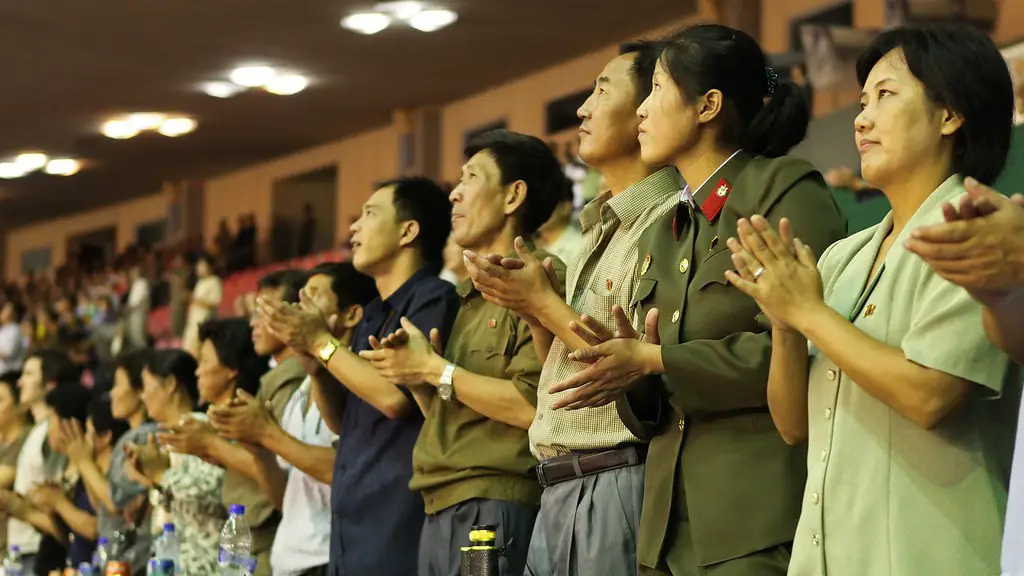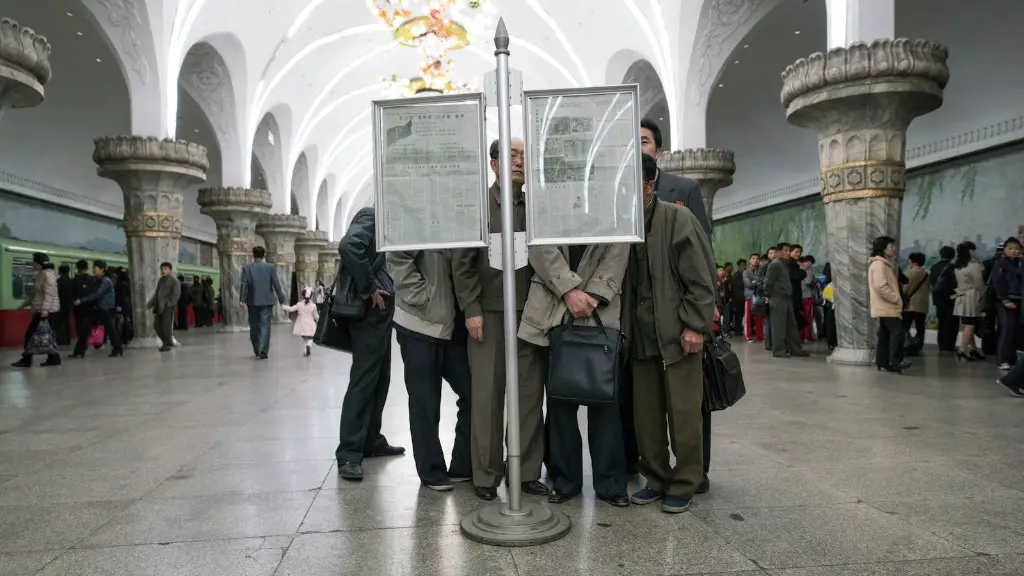North Korea’s Threat
The United States has long been aware of North Korea’s threat to the security of the region. A nuclear-armed North Korea, hostile to the US and its allies, has the potential to create an alarming level of instability. The US has sought to contain this threat by diplomatic and economic forces, with few tangible results. Now, US president Donald Trump has promised that ‘maximum pressure’ will be applied to this crisis, leading to speculation that military action could be on the table.
Since the late 1990s, North Korea has been developing nuclear weapons and ballistic missiles, in defiance of international law and sanctions. The UN Security Council has responded by imposing several rounds of increasingly harsh sanctions, most recently in August 2017. Although North Korea has indicated an intention to denuclearize, few believe that they are genuine in these claims, as they have continued to advance their nuclear program.
Reasons for the Failure of Past Sanctions
It’s no secret that past sanctions against North Korea haven’t been successful in curbing their nuclear ambitions. Experts point to several reasons for this failure, one of which is the fact that North Korea has found ways to circumvent the sanctions. Through trading with neighbouring countries such as China and Russia, as well as by using false companies, North Korea has been able to avoid the effects of sanctions.
Another factor can be attributed to the different geopolitical interests of the US and its allies in comparison with China and Russia. While the US and its allies are trying to exert economic and diplomatic pressure on North Korea, China and Russia have been unwilling to take measures that could lead to the collapse of the North Korean regime.
Finally, the US has been unable to adequately enforce the most recent UN sanctions, as failure to do so largely depended on cooperation from China and Russia. As these countries have not complied with the sanctions, they are largely ineffective.
The Risks Associated with Military Action
Military action against North Korea is seen as a last resort by many countries in the region, due to the potential risks and collateral damage it could cause. North Korea is believed to possess chemical and biological weapons, as well as a standing army of over two million people. If military action were to be taken, there is no saying how they would respond.
North Korea’s military capabilities are not to be underestimated. The US military estimates that North Korea’s conventional forces could inflict considerable casualties, both on US and South Korean forces, in the event of a conflict. In addition, North Korea may respond with a nuclear strike if it believes its existence is threatened. In such a scenario, the US could potentially be drawn into a war with a nuclear-armed adversary, with potentially disastrous consequences for the region.
The Need for Diplomatic Solutions
Given the risks associated with military action, it is clear that diplomatic solutions are the preferred option. To this end, the US has sought to exert diplomatic and economic pressure on North Korea through sanctions and negotiations.
In 2017, the US, along with Japan and South Korea, proposed the ‘maximum pressure’ strategy, which seeks to bring North Korea to the negotiating table. In the same year, Trump agreed to meet with the North Korean leader, Kim Jong Un, in an effort to denuclearize the Korean Peninsula. While these negotiations have yielded few tangible results, there is still hope that an agreement can be reached, if both sides are willing to compromise.
The Role of China and Russia
China and Russia are key players in the North Korean crisis, as these countries are North Korea’s largest trading partners. Though both countries have implemented UN sanctions against North Korea, they have been unwilling to cut off ties completely, as a collapsed regime would destabilize the region.
However, there is hope that China and Russia can be persuaded to take a more proactive role in the crisis. In 2017, a senior North Korean official visited China in an attempt to mend strained diplomatic ties, and in 2018, both China and Russia voted in favour of a United Nations resolution that imposes further sanctions on North Korea.
It is clear that China and Russia will have an important role to play in the denuclearization of the Korean Peninsula. If the US can find a way to successfully engage these countries in the process, then there is a chance that North Korea’s nuclear ambitions could be curtailed.
Can the US Wipe Out North Korea?
The question of whether the US can successfully wipe out North Korea is one that has been debated for many years. While military action remains a distant possibility, economic and diplomatic solutions are seen as a more viable option.
Despite immense international pressure and multiple UN Security Council resolutions, North Korea has continued to develop its nuclear program. Hence, it is likely that any resolution to the crisis will need to come from the negotiations table.
Though negotiations have failed to produce tangible results in the past, there is still hope that an agreement can be reached, if the US and its allies are able to engage China and Russia in the process. As these countries are North Korea’s largest trading partners, they will have an important role to play in any successful resolution.
Is North Korea’s Nuclear Program Irreversible?
Some experts argue that North Korean nuclear program is now irreversible, due to the technological advances they have made in recent years. North Korea has been able to develop nuclear weapons and long-range intercontinental ballistic missiles, despite the numerous economic sanctions imposed.
However, this does not mean that there is no hope for a resolution. Even though North Korea has made technological advances, its nuclear program is not yet fully developed. It is possible that a diplomatic solution could still be reached, if the US is able to engage China and Russia in this process.
What Would a Successful Negotiation Look Like?
Experts agree that for a successful negotiation to take place, both sides would need to make significant compromises. North Korea would need to accept complete denuclearization and the US would need to provide some form of security guarantees. In addition, a successful negotiation would also need to address North Korea’s human rights abuses and its proliferation of weapons of mass destruction.
The process of denuclearization could be a lengthy one and involve monitoring and verification by international inspectors. However, if both sides are willing to compromise, a mutually beneficial agreement could be reached.
What Would be the Outcomes of a Successful Negotiation?
A successful negotiation between the US and North Korea would have far-reaching implications for the region. If North Korea is able to denuclearize and the US is able to provide security commitments to the North, then it would lead to the stabilization of the region. In addition, it could pave the way for diplomatic and economic normalization with the rest of the world.
It could also have wider implications, as it would set a precedent for other states to follow. A successful negotiation would demonstrate that diplomacy is an effective tool for resolving international conflicts and that nuclear proliferation can be curbed by peaceful means.
Can Sanctions Alone End the Crisis?
Though economic sanctions and diplomatic pressure have been used as tools to contain the North Korean crisis, they have, so far, been largely ineffective. It has become clear that sanctions alone cannot effectively contain North Korea’s nuclear ambitions and that diplomatic and economic cooperation between the US and its allies would be necessary.
The US has attempted to enlist the help of China and Russia in implementing the sanctions, but with mixed results. Unless China and Russia are willing to take a proactive role in the negotiations process, it is unlikely that the sanctions will be effective.
What Can the US Do in the Short Term?
In the short term, the US and its allies should seek to contain the North Korean threat by maintaining economic and diplomatic pressure. This could involve keeping in place existing sanctions and diplomatic initiatives, as well as seeking more effective ways to enforce them.
The US should also continue to engage in dialogue with China and Russia, in order to ensure that they are taking an active role in the denuclearization process. The US and its allies should also make it clear that they are open to negotiations and that they are willing to make concessions, if necessary. These efforts, while not a guarantee of success, could lay the foundation for a successful resolution of the crisis.


